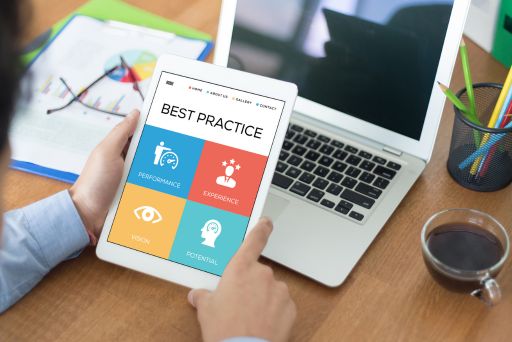Running a construction business involves much more than just overseeing projects; it requires diligent financial management and accurate accounting to ensure the company’s financial health and success. In the construction industry, where profit margins can be narrow, efficient construction accounting is essential. This article outlines eight crucial steps to help construction companies navigate the complexities of construction accounting effectively.
How Construction Accounting Differs

Accounting in the construction industry presents unique challenges compared to other businesses due to the intricacies of the field. These differences stem from the nature of construction work, specific revenue recognition methods, per-project pricing structures, job costing intricacies, fluctuating operating expenses, and various aspects inherent to construction projects.
Construction companies face a range of distinct requirements, necessitating the ability to meticulously track precise costs, competitively bid on projects, adhere to prevailing wage regulations, and manage a host of other accounting responsibilities. Here are the key distinctions that set construction accounting apart from other forms of accounting:
Project-Based
Construction enterprises operate on a project-by-project basis, often managing multiple projects simultaneously. Unlike businesses where payment typically aligns with the completion of a transaction, construction projects follow diverse payment schedules. Some may require upfront deposits, while others might entail full payment upon completion, or settlements that occur months after project finalization. Consequently, construction companies may find it necessary to generate individual profit and loss (P&L) statements for each project.
Diverse Services
In contrast to conventional businesses that usually offer a limited range of products or services, construction companies provide a wide spectrum of services. This can encompass service work, design services, consulting, engineering, material sourcing, and more. This diversity makes it challenging to track expenses accurately and calculate profits associated with each service category.
Fluctuating Overhead Costs
Construction firms experience fluctuating overhead expenses encompassing insurance, travel, workers’ compensation, materials, subcontractor fees, equipment, and various other factors. These costs must be meticulously considered in construction accounting, both at the project level and for the overall business.
Cost of Goods Sold
Unlike many businesses that primarily record the cost of products sold, construction companies have a more complex landscape. Each project incurs both direct and indirect costs that can fall into a wide array of categories. Consequently, contractors must employ effective methods for monitoring income and expenses while ensuring meticulous reconciliation of every financial transaction.
Long-Term Contracts
Construction companies often manage contracts with varying durations, including both short-term and long-term commitments. This diversity in contract timelines means that income may not arrive at consistent monthly intervals. To effectively manage cash flow and maintain accurate financial records, construction businesses require a flexible yet organized accounting system.
How to Do Construction Accounting
1. Understand Construction Accounting
Construction accounting is a specialized branch of accounting that caters to the unique financial needs of construction companies. It involves tracking construction project costs, managing revenue recognition, handling cash flow, and complying with industry-specific accounting methods and regulations.
2. Set Up Your Accounting System
To kickstart your construction accounting journey, you need a robust accounting system. This system should allow you to track business finances accurately. Key components include:
-
- Business Bank Account: Open a separate business bank account to keep your personal and business finances distinct.
-
- Accounting Software: Consider using construction accounting software tailored to the industry’s needs. Several options are available that can help streamline bookkeeping and financial management.
-
- Chart of Accounts: Develop a comprehensive chart of accounts that categorizes income, expenses, assets, and liabilities specific to construction.
3. Choose an Accounting Method
A construction company can use either the cash method or the accrual method for accounting. The cash method records transactions when money changes hands, while the accrual method records transactions when they are incurred, regardless of when the payment is received. Select the method that aligns with your business operations and financial goals.
4. Implement Job Costing
Job costing is a fundamental concept in construction accounting. It involves tracking all costs associated with individual construction projects. This includes material costs, labor costs, equipment costs, and overhead costs. Job costing enables you to monitor the profitability of each project and make informed decisions to protect your profit margins.
5. Recognize Revenue Accurately
The construction industry often uses two revenue recognition methods: the percentage of completion method and the completed contract method. The percentage of completion method recognizes revenue based on the project’s progress, while the completed contract method recognizes revenue only when the project is completed. Choose the method that best suits your business and complies with industry standards.
6. Track Project Expenses
Managing project expenses is critical for maintaining financial health. Keep a close eye on direct and indirect costs, such as labor costs, material costs, administrative costs, and mobilization costs. Accurate tracking of expenses allows you to monitor project profits and make necessary adjustments.
7. Monitor Cash Flow
Cash flow management is essential in construction accounting. Since construction projects often involve substantial upfront costs, it’s vital to ensure you have the necessary liquidity to cover expenses. Regularly review your cash flow statements to identify potential cash shortages and plan accordingly.
8. Stay Compliant
Construction companies must adhere to various regulations and prevailing wage requirements, which can vary by location. Stay informed about these requirements and ensure your accounting practices are compliant with industry and legal standards.
Construction accounting plays a pivotal role in the financial success of construction businesses. With accurate accounting, you can track project costs, manage cash flow, and make informed decisions to protect narrow profit margins. By understanding the unique challenges of construction accounting and implementing these eight essential steps, you can set your construction business on the path to financial stability and long-term success.

Tips for Managing Your Construction Accounting Processes
Here are some valuable steps to kickstart your construction accounting journey, ensuring that your bookkeeping and financial management stay on the right track:
1. Segregate Personal and Business Expenses
For construction firms, the initial crucial step is to establish a separate business bank account exclusively dedicated to your business finances. This separation streamlines financial management and organization. To initiate a business bank account, you will typically require a social security number or employer identification number (EIN), personal identification (such as a driver’s license or passport), a copy of your business license, and relevant organization documents filed with the state.
2. Break Down Project Costs with Job Costing
Given the project-centric nature of construction accounting, adopting a job costing system is essential. Job costing allows you to meticulously track, categorize, and report financial transactions for each project. This method ensures accurate accounting for profitability on a per-contract basis, helping you ensure that your service prices adequately cover all overhead expenses. Job costing involves calculating the cost of labor, materials, and overhead for each specific project, represented as Total Job Cost = Direct Materials + Direct Labor + Applied Overhead.
3. Record Day-to-Day Financial Transactions
Use various tools such as journals, spreadsheets, or construction accounting software to document daily transactions, encompassing accounts payable, accounts receivable, labor costs, and material expenses. Ensure that each transaction includes a description, transaction date, and revenue received. Utilizing construction invoice templates can simplify billing for clients and maintain a comprehensive paper trail of all construction projects and generated revenue.
4. Select Appropriate Revenue Recognition Methods
Revenue recognition in construction accounting differs from regular business accounting due to the industry’s nature. For companies handling long-term contracts, two primary revenue accounting methods exist:
-
- Completed Contract Method: Under this method, contract revenue recognition occurs upon project completion.
-
- Percentage of Completion Method: Revenue recognition is based on the percentage of project completion within the fiscal year, calculated by comparing incurred expenses allocated to the contract during the year to total estimated costs. Generally, construction businesses with gross receipts exceeding $10 million must use the percentage of completion method for tax purposes. Those with gross receipts below $10 million can apply the completed contract method for projects lasting less than two years but must use the percentage of completion method for longer projects. Generally accepted accounting principles recommend using the percentage of completion method for financial statements.
5. Track Business Expenses
Categorize expenses by service and individual job to facilitate tracking of both income and expenditure. Employ an expense tracker and keep receipts to monitor expenses and project profits for each job. Common construction industry expenses encompass
- business registration and licensing,
- bank fees,
- tools and equipment,
- travel expenses (including fuel),
- electronics,
- trade school tuition,
- vehicle maintenance,
- phone and internet costs,
- lodging,
- software subscriptions,
- membership fees (unions and associations),
- mileage (for tax purposes),
- insurance, lease payments,
- safety equipment and uniforms,
- subcontractors,
- employee payroll,
- advertising, and marketing.
6. Reconcile Bank and Supplier Statements
Regularly reconcile bank statements with your own accounting records, invoices, and payments. This process involves comparing bank records to expense receipts, identifying any discrepancies, and ensuring alignment between your construction accounting system and your bank account. Address any inconsistencies by contacting your bank.
7. Pay Estimated Taxes
Construction companies typically pay estimated quarterly taxes, with various methods available, including Electronic Federal Tax Payment System (EFTPS) enrollment, online payments via the IRS website, debit or credit card transactions, or mailing checks or money orders to the IRS.
Your choice of a tax calculation approach can include a “completion percentage” method, which calculates taxes based on quarterly income and expenses, or a “completed contract” method, which assesses taxes owed on each individual contract. A reliable accounting strategy should be chosen to minimize confusion during tax time, and professional assistance may be advisable.
8. Consider Hiring an Accountant (Optional)
While managing construction accounting independently is possible, the complexities of owning a construction company may lead to costly accounting errors. Similar to having project managers overseeing job sites, employing a professional accountant to handle various transactions across different jobs and services can be beneficial.
Accountants provide clarity on financial data, manage books, generate reports, estimate quarterly tax payments, maintain cash flow, and safeguard narrow profit margins.
9. Leverage Construction Accounting Software
To elevate your construction accounting beyond manual methods and spreadsheets, consider utilizing construction accounting software. This software streamlines tasks such as online invoicing, expense tracking, payment monitoring, financial report generation, and more. Clients tend to have greater trust in businesses employing accounting software due to its secure and convenient online payment capabilities. Additionally, construction accounting software equips you with the necessary tools to manage accounting effectively and make informed financial decisions.
Efficient construction accounting is imperative for the success of construction companies. It goes beyond project oversight, serving as the linchpin for financial health and long-term viability in an industry known for its tight profit margins and intricate project intricacies. The unique challenges of construction accounting, from specialized revenue recognition to complex job costing, demand meticulous attention and adherence to industry standards.
To navigate these complexities, construction companies should adhere to the eight crucial steps outlined in this article, which include understanding construction accounting nuances, setting up a robust accounting system, choosing the right accounting method, implementing job costing, and monitoring cash flow.
Additionally, practices like segregating personal and business expenses, reconciling statements, and utilizing construction accounting software can bolster financial stability and foster trust with clients.

Construction accounting is the backbone of a thriving construction business, safeguarding profit margins and ensuring long-term prosperity. By embracing its intricacies and following the prescribed steps, construction companies can fortify their financial foundations and thrive in this dynamic and challenging industry.
Frequently Asked Questions (FAQs) on Construction Accounting:
1. What makes construction accounting different from other forms of accounting?
Construction accounting differs due to the project-based nature of work, diverse revenue recognition methods, fluctuating operating expenses, job costing intricacies, and the need to manage revenue recognition across long-term contracts.
2. What are the primary challenges faced in construction accounting?
Construction accounting faces challenges like managing diverse services, fluctuating overhead costs, accurately tracking costs of goods sold, dealing with long-term contracts, and reconciling project-based revenue recognition.
3. How do construction companies manage project-specific finances effectively?
To manage project finances, construction companies employ job costing to track costs associated with individual projects, recognize revenue accurately based on project completion, and monitor cash flow meticulously.
4. Which accounting methods are commonly used in construction accounting?
The two primary revenue recognition methods in construction accounting are the percentage of completion method (recognizing revenue based on project progress) and the completed contract method (recognizing revenue upon project completion).
5. Why is segregating personal and business expenses crucial in construction accounting?
Separating personal and business expenses is essential to maintain financial clarity, streamline accounting processes, and ensure accurate financial reporting, especially for tax purposes.












































